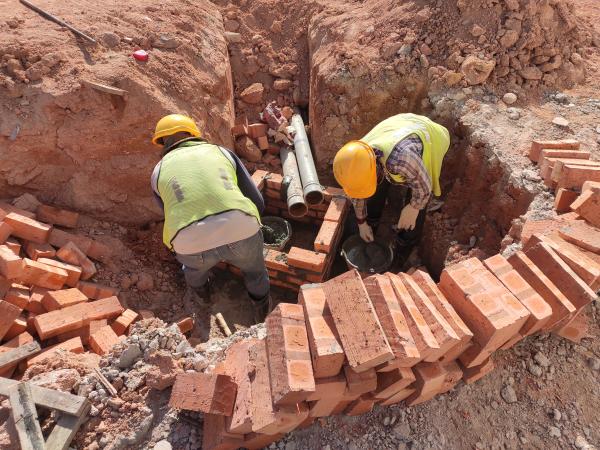
INFRASTRUCTURE CHARGES BUILD A NETWORK WE CAN ALL RELY ON
Infrastructure charges play a vital role in benefitting the development industry and the community. They can only be used to:
- Fund trunk infrastructure for new development, such as large water mains, treatment plant upgrades and pumping stations.
- Reimburse (offset) trunk infrastructure delivered by developers.
- Deliver essential infrastructure for water and wastewater services to safety standards.
- Ensure catalyst infrastructure projects that generate consultant, contractor and construction jobs.
No profit is earned from collection of infrastructure charges. These charges do not fund general maintenance and cannot be used for anything but trunk infrastructure.
Without infrastructure charges there may be diminished investment in essential infrastructure, increased development sector job losses, and a reduced capacity to fund reimbursement of developer delivered trunk infrastructure.
Planning legislation in the States and Territories provides for a system to facilitate planning for the orderly use and development of land to achieve a range of public benefit objectives, one such objective being to assist the provision of public utilities, infrastructure and facilities for the benefit of the community.
To that end, planning legislation includes mechanism for a State or Territory government, or a Local Government, to impose fees and charges for the improvement and upgrade of key infrastructure. (eg. Planning Act 1999 (NT), s.135, the Minister may, by notice in the Gazette, prescribe the fees to be charged in relation to matters under this Act).
The Nhulunbuy Corporation Limited (NCL) has the same functions as a local government as if it were a council for a shire constituted under the Local Government Act 2019 (NT) (LGA), s.355.
The Nhulunbuy Corporation is also tasked with facilitating the transfer of the management of the township of Nhulunbuy to another entity on the prospective transition of the Town. Regulatory compliance and parity with NT laws will be a critical factor in any transfer.
The legal authority for the Nhulunbuy Corporation Limited to levy fees and charges for the maintenance of infrastructure arises from RTA Gove’s lease arrangements with sub-lease and the conditions of DA/BA approval process.
(As defined by the Northern Territory Planning Scheme 2020 and Nhulunbuy Town Development plan 2011)
| Single Dwelling Residential | Single dwellings on individual allotments. |
| Medium Density Residential | Duplexes, units and hostels to a maximum height of two storeys. |
| High Density Residential | Units and hostels three storeys and above in height, |
| Community Purpose | Community uses, including schools, health facilities, churches, community and social clubs, government and civic administration buildings and public utilities. |
| Organised Recreation | Areas for organised indoor and outdoor recreational activities. |
| Public Open Space | Areas retained as open space, parks, reserves and playgrounds. |
| Light Industry | Workshop, manufacturing, catering and storage / depot uses which do not affect the amenity of the surrounding locality. |
| General Industry | All of Nhulunbuy Industrial Estate SPL250. |
| Commercial | Business uses, including shops, motels, service stations and tourism purposes. |
| For further more detailed information please refer to the Northern Territory Planning Scheme 2020, Part 4 - Zones and Assessment Tables. | |
The issuing of an infrastructure charges notice may be triggered by assessable development or development requiring compliance assessment.
The types of development that may trigger the issuing of an infrastructure charges notice are:
(a) reconfiguring of a lot;
(b) material change of use; and
(c) carrying out building work.
A levied charge is payable at the following time:
(a) if the charge applies to reconfiguring a lot that is assessable development – when the Nhulunbuy Corporation approved the plan of subdivision for the reconfiguration.
(b) if the charge applies to a material change of use – when the change of use happens
(c) if the charge applies to building work that is assessable development – when the final inspection certificate (for a single detached class 1a building or class 10 building or structure) or certificate of classification (for a building or structure of another class) for the building work is given.
(d) if paragraphs (a), (b) and (c) do not apply, on the day stated in the infrastructure charges notice or negotiated infrastructure charges notice under which the charge was levied.
(e) as otherwise specified in a written agreement between Nhulunbuy Corporation and the applicant, including whether it may be paid by installments.

Infrastructure charges are legislated charges payable where new development is proposed. The charges are applied so we can fund the cost of providing new or upgraded trunk infrastructure.
